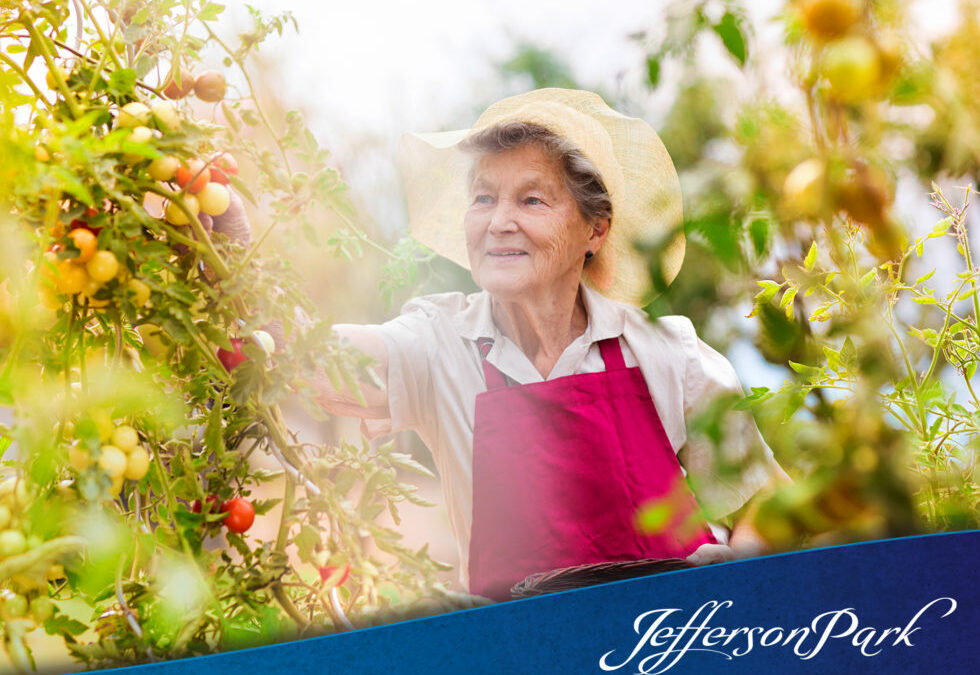Gardening is a beautiful and magical experience that is loved by people of all ages, from children to seniors. What you may not know is that this enjoyable and rewarding activity also comes with many health benefits, especially for seniors. Studies have proven that getting your hands dirty in a garden can provide great physical and mental benefits for senior health. Now that the weather is warmer, it’s the perfect time to get outdoors, dig around in the dirt, and grow something beautiful. Here are some of ways gardening can improve senior health.
Health Benefit #1: Improved Moods and Lower Stress Levels
Spending time in nature is known to improve emotion and help regulate moods. Nature calms people and makes them happier. Gardening also provides light aerobic exercise for seniors, which causes an increase in the production of dopamine and serotonin. These two hormones are considered happy hormones, and their presence improves moods and encourages positive emotion. Additionally, this type of light exercise decreases levels of the stress hormone cortisol. This means seniors who garden will have improved moods and feel less stress, both of which factor into having good overall senior health.
Health Benefit #2: Decreased Risk of Depression
As mentioned above, gardening can increase the production of happy hormones and reduce stress hormone levels. This better balance of chemicals in the brain can reduce the risk of depression for those in senior care. When aging adults spend all their time sitting indoors, they are at a high risk of becoming depressed. Getting their feel-good hormone levels up with the help of nature and light exercise can make them less likely to experience depression, allowing them to live happier and healthier lives.
Health Benefit #3: Improving Dexterity and Strengthening Muscles
Gardening is a great form of exercise for aging adults. When you garden, you have to move your body. This is great for seniors who live otherwise sedentary lives. Digging in the dirt, planting seeds, pulling weeds—all of these gardening activities require the use of the hands and arms, which can help seniors improve dexterity and hand-eye coordination, keeping the brain and body in sync. Gardening also works out the rest of the body by encouraging seniors to bend, squat, stretch, push, and pull. This engages a lot of muscles, strengthening them to help aging adults maintain their mobility and good physical senior health. Just a few hours of gardening each week provides seniors with the kind of low-intensity workout they need. As an added bonus, gardening also burns calories. Planting and pulling weeds can burn between 200 and 400 calories in an hour, helping aging adults stay in good shape.
Health Benefit #4: Better Heart Health
In addition to improving moods, dexterity, and muscle strength, the exercise that aging adults get from gardening is also great for the heart. Regular moderate exercise decreases the risk of many heart problems and other health issues. This type of regular exercise can help reduce the risk of high blood pressure, heart disease, stroke, type 2 diabetes, obesity, colon cancer, and osteoporosis. Gardening is considered a moderate-intensity level of activity by the Centers for Disease Control and Prevention. According to the CDC, gardening for just two and a half hours a week can help to decrease health risks for aging adults.
Health Benefit #5: Exposure to the Sun
A little bit of sun exposure goes a long way for senior health. Sun exposure allows the body to soak up vitamin D, which is essential for senior health. Vitamin D helps regulate moods and supports a healthy immune system, as well as aids in calcium absorption to improve bone health. Having strong bones and a good immune system is a concern for many aging adults, and soaking up some rays while gardening can help make that happen. However, seniors need to make sure they don’t overdo their sun exposure. As we age, our skin becomes more fragile, so aging adults need to be sure to wear sunscreen while they are gardening and limit their sun exposure to short periods of time.
Health Benefit #6: Decreased Risk of Dementia
Gardening has both physical and mental demands. The activity requires critical thinking and problem solving because you have to think about what you are going to plant, how you are going to take care of the plants, and how you are going to deal with different problems that may arise. This keeps an aging mind active, which can be beneficial for reducing the risk of developing dementia and Alzheimer’s disease. Gardening also helps seniors who already have dementia because it stimulates multiple senses at once, thus helping these aging adults connect to their present physical environment.
Flourishing Senior Care in an East Tennessee Nursing Home
Now that we are in prime gardening weather, you should encourage the aging loved one under your care to take up gardening. As you can see, there are a number of great benefits for senior health that can be reaped from this enjoyable activity. If your loved one can’t get outdoors to garden, you may want to consider helping them start a mini garden on a windowsill or in a terrarium. These options can allow your aging loved one to experience some of the benefits of gardening and enjoy the vibrancy of new life within the safety and comfort of the indoors.
If your aging loved one needs more help than you can provide on your own, Jefferson Park is here for you. Our nursing home provides senior care in a loving, home-like environment where we treat all of our residents like family. We have fun activities throughout the year to encourage our elders to stay active and have fun. Our senior care facility also offers rehabilitation and therapy services to all of our residents to help them maintain good senior health. To learn more about who we are and what services we offer, call us at 865-397-3163 or reach out to us online.

